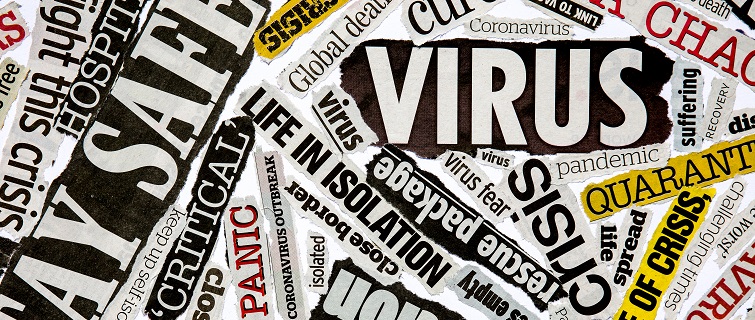jeu, Jan 1st 1970
Rédaction d'un article dans un journal local NZZ this week, Nicola von Lutterotti explores how the euphoria surrounding Covid-19 vaccinations may have clouded the critical view — European media, politicians and scientists who promised too much when it came to vaccines. Right-wing circles speak of a “vaccination lie.” Did the media misinform?

When the vaccination campaign picked up speed in early 2021, there was general hope that a high vaccination rate could soon put an end to the COVID-19 pandemic. The pressure on all those who did not want to be vaccinated increased significantly as a result. However, this did not only come from politicians and scientists, but also from the media, as illustrated by a report in the German media outlet Tageszeitung at the end of August 2021.
For the study, the authors studied how 3G vaccination certificates were checked at several tourist hotspots, in cinemas and restaurants around Berlin. They found that certificates were only briefly checked in a few places, if at all.
“It is surprising that nobody at the federal and state level is really interested in whether and how the 3G rule is being reviewed,” the authors reported in the study. “Because it is now practically the only instrument that the federal and state governments rely on in the fight against the rising corona numbers. And they are currently increasing at high speed.”

The media: Now we need vaccinations
At that time, a number of journalists in the local media also insisted on the introduction of stricter measures. “Compulsory vaccination is the lesser evil,” wrote one journalist in an opinion piece in the Swiss newspaper Tages-Anzeiger dated November 18, 2021. In it, the author argues that the “question of compulsory vaccination is not about good or bad, and all dictatorship comparisons and Apartheid associations are obscene. It’s about the classic weighing up of costs and benefits, about the dilemma of which of the two evils caused by an emergency is the greater.” An article in the Berner Zeitung published a month later echoed “Now it is mandatory to vaccinate.”
On the other hand, the NZZ titled an article on November 9, 2021 “Problematic indirect compulsory vaccination due to the Covid certificate."
“Vaccination against Covid-19 is a key tool in combating the corona pandemic. From a legal point of view, however, the ‘pressure on the unvaccinated’ deliberately created with the Covid certificate must be questioned,” the article states. These examples show that the media was heavily involved in pandemic policy – and many saw vaccination or even compulsory vaccination as the solution to all problems.
Critical reports about the federal government’s Covid-19 measures were generally few and far between. This is illustrated by Clara Goebel, a Zürich student who reviewed 42,000 articles published in 48 Swiss media outlets from January 2020 to April 2022 as part of her master’s thesis. The thesis examines the articles and asks how far the public was deceived in terms of persuading them to get vaccinated – an effort that now seems strikingly ineffective.

BioNtech co-founder Ugur Sahin in Germany, September 2020.
BioNtech has high expectations, Bild celebrates
Ever since a Pfizer representative confirmed at a hearing in the EU Parliament that the vaccine had not been tested for third-party protection before it was approved, there has been talk of a “vaccination lie” in primarily right-wing and vaccination-critical circles. The vaccine manufacturers BioNtech/Pfizer are accused of having fooled the public into believing that their vaccine would prevent the spread of new strains of corona viruses.
Anyone reading the publicly available results of the approval studies can easily see that this does not correspond to the facts. This shows that the external protection was not tested. However, this does not relieve the media and politicians of their responsibility. Especially since the approval studies were obviously hardly read. Instead of questioning their own role when it comes to exaggerated promises of vaccination, some leading media are currently focusing on denying the existence of a “vaccination lie.”
On October 19, 2022, the German broadcast service ARD, claimed in an “investigative report” that “foreign protection was given” that the vaccination initially protected against transmission of the virus – and thus defended all those politicians and journalists who had claimed exactly that.
Swiss Federal Councilor Alain Berset (Social Democratic Party) justified the need for mandatory vaccination certificates when he announced (wrongly) that the “certificate shows that you are no longer contagious.” Meanwhile, the founder and CEO of BioNtech, Ugur Sahin, made a similar statement shortly after.
“The number of people for whom the Covid-19 rapid PCR test is positive and who are therefore potentially contagious decreases by 92 percent after the vaccination,” he told German newspaper Bild on February 27, 2021. The journalist logically concluded that getting vaccinated “means you are no longer contagious!”

Hopes for herd immunity that never existed
Celebrated by Bild as a “vaccination hero,” the Biontech boss never actually made the claim. In that same interview he does not refer to his own company’s approval study, but uses a survey that was conducted in Israel that looked at the effectiveness of the second vaccine within one week of administering it. Like many other studies at that point, it was too short of a timespan to discern whether vaccinate people are able to pass on Covid-19 or not.
Nonetheless, these studies reinforced the belief then that rapid population immunization could eradicate the virus. In July 2020 – long before the Covid-19 vaccine was available – the Swiss epidemiologist Marcel Salathé told local media outlet Blick that “herd immunity will come with the vaccine.”
What many have already forgotten is that for a long time there was an intense debate about how large the proportion of vaccinated and recovered people in the population must be in order to achieve so-called herd immunity. If scientists initially spoke of 60 to 70 percent, they corrected their estimates upwards as time went on.
A German mathematician said in Focus in October 2021: “In the case of the delta mutant, which occurs almost exclusively in our country, we should achieve herd immunity with an immunization rate of 80 percent of the total population.”

Other scientists, meanwhile, expressed doubts about the achievability of this goal at an early stage. The fact that the number of infections keeps increasing massively – and that, according to the federal data, around 97 percent of the Swiss population has now been vaccinated or recovered – shows that the skeptics were right. The constant back and forth over the effectiveness of the vaccination campaign caused considerable uncertainty among the population.
Despite this confusing and sometimes erroneous reporting, public acceptance of the media does not seem to have decreased during the Covid-19 pandemic. In fact, quite the opposite, according to Christian Hoffmann from the Institute for Communication and Media Studies at the University of Leipzig.
“As our surveys in Germany show, many people got their information about Covid-19 from daily newspapers, radio and television,” he said, adding “On the other hand, they trusted social media much less.”
Cet article peut être librement partagé et réimprimé, à condition qu'il renvoie clairement à l'article original.
